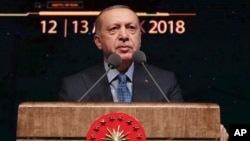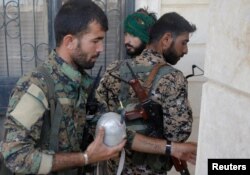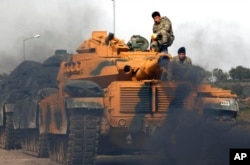A Turkish military operation against the Syrian Kurdish militia, the YPG, will start in the next few days, according to Turkey's President Recep Tayyip Erdogan. With the YPG being a key U.S. ally in the war against the Islamic State, such a move threatens to resurrect recent tensions between the two NATO allies.
Ankara considers the YPG a terrorist organization affiliated to the PKK rebel group that has been fighting a decades-long insurgency inside Turkey. "It is time to realize our decision to wipe out terror groups east of the Euphrates," Erdogan said in a speech at the Turkish Defense Industry Summit held at the presidential complex.
The YPG, fighting the Islamic State with U.S. backing, seized hundreds of kilometers of the Syrian-Turkish border, running from the east of the Euphrates River to the Iraqi frontier.
"Mr. Erdogan words have to be taken seriously," said former senior Turkish diplomatic Aydin Selcen. "It's [YPG] a threat to Turkish national security, an extension of PKK affiliate is controlling the Syrian border."
U.S. Pentagon spokesman Cmdr. Sean Robertson told VOA in a statement, "Unilateral military action into northeast Syria by any party, particularly as U.S. personnel may be present or in the vicinity, is of grave concern. We would find any such actions unacceptable."
"Coordination and consultation between the U.S. and Turkey is the only approach to address issues of security concern in this area," he added.
In the past 18 months, Turkish forces have carried out a series of military operations into Syria, ousting the YPG from large swaths of territory, which remain under Turkey's control.
Following Erdogan's speech, local media reported Turkish tanks and armored cars moving toward the Syrian border, reinforcing an already sizable military presence, facing off against YPG bases.
Analysts point out the mostly flat topography of the region gives the Turkish military the advantage against the lightly armed YPG forces.
Allies against IS
Until now, Washington was seen as the main factor holding back Ankara from attacking the militia. The recent shelling of the YPG by Turkish artillery led to Washington deploying a series of military observation posts between the militia and the Turkish frontier this month in a move seen as deterring further attacks. Ankara accused Washington of protecting terrorists.
The YPG is a crucial U.S. ally in the war against the Islamic State. About 2,000 U.S. soldiers are deployed with the militia, most of whom are based in the region that Ankara is warning it will now attack.
The YPG is currently engaged in heavy fighting against one of the Islamic State's last bastions on the Syrian Iraqi border. Previous Turkish military threats against the militia resulted in the YPG temporary suspending military operations against IS.
"The campaign against ISIS is not over," Pentagon spokesman Bean told VOA, using an acronym for the militant group."Coalition forces are working closely with the Syrian Democratic Forces, who are in the midst of offensive operations against ISIS in the Middle Euphrates River Valley. The SDF remains a committed partner against ISIS and we remain committed to working with them to ensure ISIS's enduring defeat."
Washington's support of the YPG is the main point of tension with Ankara. Bilateral tensions almost reached a breaking point earlier this year, but in the last few months, relations had started to improve.
Turkey-U.S. relations
A series of high-level bilateral meetings have occurred in the past few weeks in which Syria topped the agenda. This month, Erdogan met with U.S. President Donald Trump on the sidelines of the Group of 20 summit in Buenos Aires. Last week, Turkey's spy chief, Hakan Fidan, was in Washington meeting with U.S. senators and White House officials.
"Turkey, right or wrong, has the impression that it can sort of push the U.S. to play along with its priorities," Selcen said. "Jim Jeffrey [U.S. ambassador for Syrian affairs] repeated time and time again their [the U.S.] cooperation with the PKK-affiliated YPG is temporary, so to speak, depending on the job at hand, fighting ISIS. So what Mr. Erdogan is doing right now is pushing that calendar."
Ankara insists that with the Islamic State all but defeated, the basis for U.S. cooperation with the YPG is over. "There is no threat named Daesh in Syria anymore. This is a fairy tale," Erdogan said Wednesday, using an Arabic acronym for the militant group.
U.S. ambassador Jeffrey visited Ankara last week, and analysts are already pointing out that Erdogan's announcement of a military operation could well be linked to that visit.
Erdogan giving several days' notice of the planned operation into Syria also could be a move to test Washington's reaction, say analysts. "The risk is that there will be a very deep political conflict with the U.S.," said former diplomat Selcen. "We have to wait 48 or 72 hours to see whether a reaction comes from Donald Trump."
Ankara likely will be watching closely how strongly, if at all, Washington reacts to the threat of a Turkish military operation and whether it confines itself only to rhetoric or takes military steps on the ground in Syria. Analysts suggest the severity of any U.S. pushback could well determine the scale of the planned cross-border operation. For now, Turkish forces are continuing their buildup on the Syrian border.
Carla Babb at the Pentagon contributed to this report.






